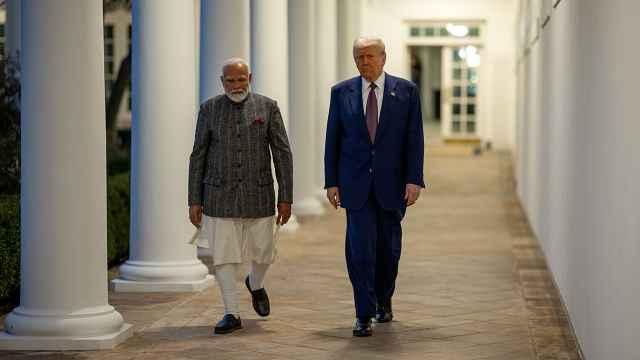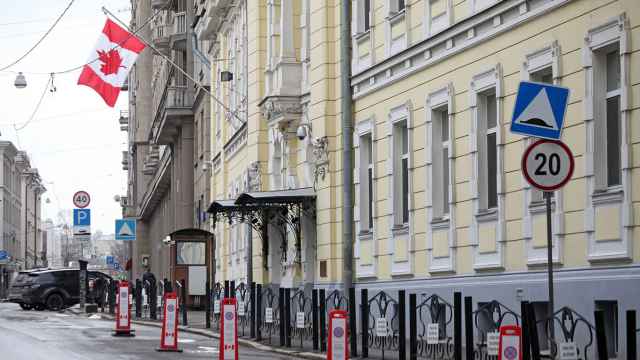After a year of iron support for its embattled Middle East ally, Russia’s recent criticism of Syrian President Bashar Assad suggests that Moscow could be planning for a future without the Arab strongman.
There is still no indication that Moscow will abandon Syria altogether and back UN sanctions against its old friend, even as the estimated body count from Assad’s crackdown on a yearlong opposition uprising has surged past 9,000.
But in recent weeks, Foreign Minister Sergei Lavrov has repeatedly criticized Assad for using excessive force and dragging his feet on reforms. Moscow also has urged Assad to take the first step and pull his troops from cities and towns in line with a peace plan put forth by UN envoy Kofi Annan.
Russia appears to have concluded things are destined to change in Syria, some experts said. It also wants to cast itself as a constructive international player, avoid blame for blocking an end to the bloodshed and ultimately retain long-term influence in Syria.
“Russia has begun to understand that the Syria that was is already gone,” said Alexei Malashenko, a Middle East expert with the Moscow Carnegie Center. “It has started to realize that Bashar Assad will be gone soon, and it needs to think about the future.”
Syria is Russia’s last ally in the Middle East, offering Moscow its only naval base outside the former Soviet Union and a stable market for Russian weapons industries, and in the past months Russia, along with China, has twice shielded Damascus from UN sanctions.
This week, Russia will host Syria’s foreign minister and then, a few days later, two separate Syrian opposition delegations, visits that come as Annan’s plan is to be implemented.
Malashenko predicted that Russia could raise pressure on Assad to force him to comply with Annan’s plan and intensify contacts with the opposition.
He also speculated that Moscow might eventually offer asylum to Assad as part of a deal for a transition of power in Damascus, even though Prime Minister Vladimir Putin has dismissed such an option.
“Russia would be able to claim credit for solving the Syrian problem if it hosts Assad,” Malashenko said.
Fyodor Lukyanov, the editor of Russia in Global Affairs magazine, argued that Moscow has adeptly played its role in the international crisis and that it could use its political capital to negotiate a safe exit for Assad along with a transition of power and guarantees for various Syrian minority groups.
“It would be unrealistic to expect Assad to retain power, the question is how he will lose it and to what extent the process will be controllable,” Lukyanov said. “Russia may play a role in that process.”
He added that Moscow could try to trade a shift in its pro-Assad stance in exchange for arms deals with the Gulf states that should compensate for the loss of the Syrian market.
It also may try to secure the Syrian opposition’s promise to let Russia keep influence in the country, Lukyanov said, adding that this would be difficult because the opposition is fragmented and its leaders may not be able to provide any such guarantees even if they wish to.
But Russia will only pressure Syria to the extent that it does not weaken itself on the international stage, analysts said.
Even as Russia has criticized Assad, it still insists that any UN resolution on Syria should refrain from ultimatums and threats to Damascus. Moscow says it learned a bitter lesson after its abstention on a UN resolution paved the way for NATO’s campaign in Libya, a mandate Russia says the alliance abused.
The Kremlin also has domestic reasons for backing the Syrian government. Putin, who will move back into the president’s seat next month, views the Arab Spring uprisings as foreign-inspired mutinies and apparently fears his own rule may come under similar pressure.
“Russia’s stance against a regime change [in Syria] will not be amended because it would amount to losing face,” said Georgy Mirsky, an expert on the Middle East and professor at Moscow’s Institute of World Economy and International Relations.
Mirsky noted that despite its growing irritation with Assad, Russia lacks the intelligence about what is transpiring in the strongman’s inner circle, as well as the technical ability to engineer a transfer of power to someone in his entourage.
“Russia wouldn’t engage in the kind of intrigues that would be far too risky,” Mirsky said. “And I don’t think that Russia has the capability to do that.”
Still, by issuing moderate criticisms of Assad, the Kremlin appears to be trying to prepare domestic public opinion for the strongman’s possible downfall.
“The Russian leadership had initially thought that Assad will crush the rebellion, but now it has started to weigh a possibility that he may lose,” Mirsky said. “They need to show that Russia hasn’t given unconditional support to Assad in case he loses.”
A Message from The Moscow Times:
Dear readers,
We are facing unprecedented challenges. Russia's Prosecutor General's Office has designated The Moscow Times as an "undesirable" organization, criminalizing our work and putting our staff at risk of prosecution. This follows our earlier unjust labeling as a "foreign agent."
These actions are direct attempts to silence independent journalism in Russia. The authorities claim our work "discredits the decisions of the Russian leadership." We see things differently: we strive to provide accurate, unbiased reporting on Russia.
We, the journalists of The Moscow Times, refuse to be silenced. But to continue our work, we need your help.
Your support, no matter how small, makes a world of difference. If you can, please support us monthly starting from just $2. It's quick to set up, and every contribution makes a significant impact.
By supporting The Moscow Times, you're defending open, independent journalism in the face of repression. Thank you for standing with us.
Remind me later.





